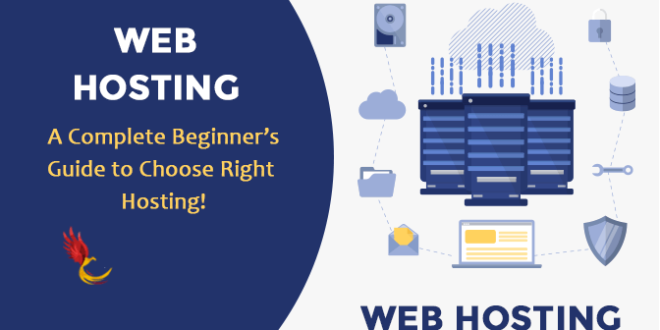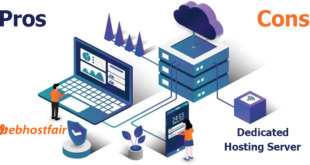Website Hosting Complete Guide
Website hosting is a crucial element in establishing and maintaining an online presence, whether for personal projects, blogs, e-commerce stores, or corporate websites. Selecting the right hosting service can impact your site’s performance, security, and reliability. This guide aims to provide a comprehensive understanding of website hosting, its various types, key features to consider, and tips for choosing the best hosting service for your needs.
What is Website Hosting?
Website hosting is a service that allows individuals and organizations to make their websites accessible on the Internet. Web hosts provide the technologies and infrastructure necessary for a website to be viewed online. This includes storage space on servers, internet connectivity, and various other features to ensure the website runs smoothly.
When you create a website, all its files, images, and content need to be stored on a server. Web hosting providers offer space on their servers for this purpose. When someone types your website’s URL into their browser, their computer connects to the server where your website is hosted, and your web pages are delivered to them through the browser.
Types of Website Hosting
There are several types of website hosting, each catering to different needs and levels of technical expertise. Here are the most common types:
1.Shared Hosting
Pros:
– Cost-effective and ideal for beginners.
– Maintenance and server management are handled by the hosting provider.
Cons:
– Limited resources since you share the server with other websites.
– Potential for slower performance during peak traffic periods.
Shared hosting is suitable for small websites, blogs, and personal projects with moderate traffic.
2.Virtual Private Server (VPS) Hosting
Pros:
– More control and customization compared to shared hosting.
– Better performance and more resources since the server is partitioned.
Cons:
– More expensive than shared hosting.
– Requires some technical knowledge for setup and maintenance.
VPS hosting is ideal for medium-sized businesses and websites with higher traffic that need more control over their hosting environment.
3.Dedicated Hosting
Pros:
– Full control over the server, including root access.
– High performance and reliability, as the server’s resources are not shared.
Cons:
– Expensive, often costing hundreds of dollars per month.
– Requires significant technical expertise to manage and maintain.
Dedicated hosting is best for large businesses and high-traffic websites that require maximum performance and security.
4.Cloud Hosting
Pros:
– Scalable resources that can grow with your website.
– High reliability and uptime due to multiple servers working together.
Cons:
– Can become expensive as your resource needs increase.
– More complex to set up and manage.
Cloud hosting is ideal for websites with fluctuating traffic and those needing scalability and high availability.
5.Managed Hosting
Pros:
– Hosting provider handles all technical aspects, including updates, security, and backups.
– High performance and tailored support.
Cons:
– More expensive than unmanaged hosting options.
– Less control over the server environment.
Managed hosting is perfect for those who prefer to focus on their business while leaving the technical details to experts.
6.WordPress Hosting
Pros:
– Optimized specifically for WordPress websites.
– Often includes features like pre-installed WordPress, automatic updates, and security enhancements.
Cons:
– Limited to WordPress sites.
– Can be more expensive than standard shared hosting.
WordPress hosting is tailored for users running their websites on the WordPress platform and seeking optimized performance and security.
Key Features to Consider
When choosing a website hosting provider, several key features should be considered to ensure you select the best service for your needs:
1.Uptime Guarantee
Uptime refers to the amount of time your website is accessible to visitors. Look for a hosting provider that offers at least a 99.9% uptime guarantee to minimize downtime and ensure your site remains available.
2.Speed and Performance
Website loading speed is crucial for user experience and SEO. Choose a hosting provider with fast server speeds and performance optimizations, such as SSD storage and content delivery networks (CDNs).
3.Security
Security features such as SSL certificates, firewalls, malware scanning, and automated backups are essential to protect your website from threats and data loss.
4.Scalability
As your website grows, your hosting needs will change. Select a provider that offers scalable solutions, allowing you to upgrade your resources easily without experiencing downtime.
5.Customer Support
Reliable customer support is vital for resolving issues quickly. Look for providers that offer 24/7 support via multiple channels, such as live chat, phone, and email.
6.Pricing and Value
While cost is a factor, consider the value you receive for your money. Compare the features and resources offered in different hosting plans to find the best balance between cost and performance.
7.User-Friendly Control Panel
A user-friendly control panel, such as cPanel or Plesk, simplifies the management of your hosting account, making it easier to handle tasks like domain management, email setup, and software installations.
Tips for Choosing the Best Website Hosting Provider
1.Assess Your Needs
Determine the type of website you’re building, the expected traffic, and the features you need. This will help you choose the appropriate hosting type and plan.
2.Read Reviews
Research reviews and testimonials from current users to gain insights into the reliability and performance of the hosting provider.
3.Check for Hidden Fees
Some hosting providers offer low initial prices but have hidden fees for renewals, add-ons, or resource overages. Read the terms and conditions carefully.
4.Evaluate Customer Support
Test the responsiveness and helpfulness of the provider’s customer support before committing to a plan.
5.Consider Future Growth
Choose a hosting provider that can accommodate your website’s growth and offers easy upgrade options.
6.Trial Periods and Money-Back Guarantees
Look for providers that offer trial periods or money-back guarantees. This allows you to test their services risk-free.
Selecting the right website hosting provider is crucial for the success of your website. By understanding the different types of web hosting, key features to consider, and tips for choosing the best provider, you can make an informed decision that ensures your website performs well, remains secure, and can grow with your business. Whether you’re launching a small blog or a large e-commerce site, investing in quality web hosting will provide the foundation needed for a robust online presence.
 webhostfair Web hosting news, reviews | Best web hosting service for your business
webhostfair Web hosting news, reviews | Best web hosting service for your business


One comment
Pingback: free website hosting - best free website hosting with a control panel